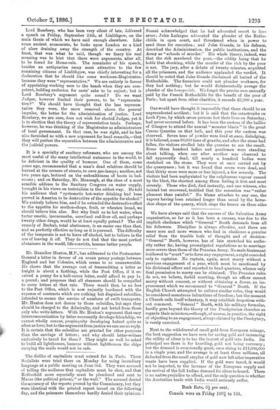Lord Rosebery, who has been very silent of late, delivered
a speech on Friday, September 24th, at Linlithgow, on the main thesis of which we have said enough elsewhere. Like some ancient economists, he looks upon London as a kind of ulcer draining away the strength of the country. At least, that was what he said, though we fancy his real meaning was to hint that there were arguments, after all, to be found for Home-rule. The remainder of his speech, besides an antiquarian essay most attractive to the few remaining citizens of Linlithgow, was chiefly interesting for a declaration that he should like some workmen-Magistrates, because they were " representative." We are entirely in favour of appointing working men to the bench when they are com- petent, holding exclusion for caste' sake to be unjust; but is Lord Rosebery's argument quite sound ? Do we want Judges, however limited their powers, to be "representa- tive ?" We should have thought that the less represen- tative they were, the more removed above the general impulse, the better for the administration of justice. Lord Rosebery, we are sure, does not wish for elected Judges, yet it is to election that the theory of representation tends. Perhaps, however, he was thinking of the Magistrates as administrators of local government. In that case, he was right, and he has also furnished us with a new argument for local councils,—that they will perfect the separation between the administrative and the judicial powers.


































 Previous page
Previous page